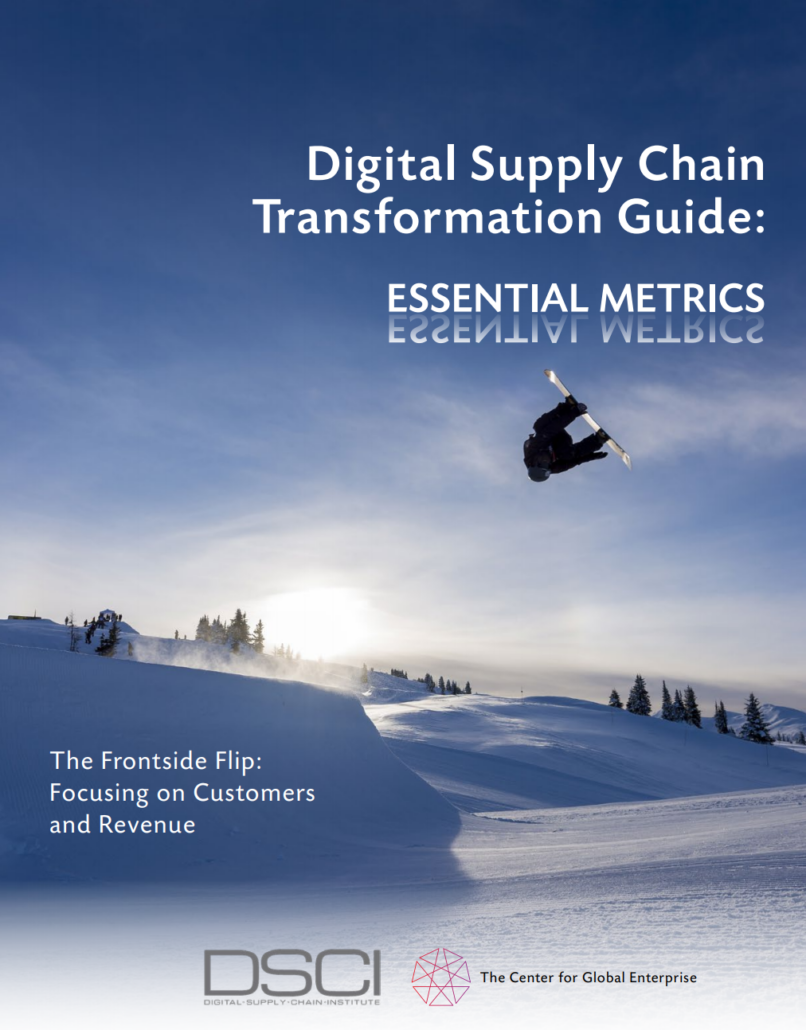If you don’t measure it, you won’t get it
It is clear that the Digital Supply Chain (DSC) has an expanded vision, one that creates success not just through minimizing cost but also through pleasing customers and growing revenue. The journey to the game changing DSC has many steps including new ways to manage Demand, People, Technology and Risk. Without the right metrics necessary, changes won’t happen. With the right metrics, closely tied to pay, your company will accelerate progress.
The necessity to develop new performance metrics was identified as a top priority by the Center for Global Enterprise (CGE) and the supply chain leaders of 24 global companies in December of 2016. These 24 companies (we call them the Global Experts Group or GEG) had just completed working, after nearly a year of effort, on the Frontside Flip, a white paper that spelled out the vision for the DSC and the revolutionary improvements that it would bring.
CGE’s Digital Supply Chain Institute (DSCI) team has developed three tools that should help accelerate progress towards the DSC:
- Transformational Maturity Assessment
- Digital Supply Chain Strategy Development Workshop
- Essential Digital Supply Chain Metrics
An assessment that will allow you to pinpoint where you are on your transformation path to the Digital Supply Chain and point out significant opportunities. We have prepared the online tool that supply chain executive can use to measure the transformation progress across four key management areas – Demand, People, technology, and Risk – across select customers, suppliers and your internal team.
The DSCI team has accumulated decades of experience in designing and facilitating executive level strategy workshops. Utilizing the DSCI “Front Side Flip”, demand-driven research and guides as a framework, the workshop blueprint will lead your senior team through a series of structured dialogs, with the goal of developing implementable strategies and actions. The content portion of the program introduces key concepts of the demand-driven Digital Supply Chain, highlights new strategies, and measures for the performance domains of Demand, People, Technology, and Risk.
Transforming to a Digital Supply Chain is the most important step for any companies, including the companies that have not traditionally considered themselves as having a supply chain focus. New Metrics are needed to drive these changes and transformational efforts to truly transform to Digital Supply Chain and to assess the transformation pathways. The DSCI team has developed a list of Essential Digital Supply Chain Metrics, which has categorized into four key management areas – Demand, People, Technology, and Risk – and into Output and Process Categories. We believe the adoption of these measures will help companies dedicated to undertaking this transformation improve revenue by an average of 10% while reducing cost by 20%.
Please contact us if you want to be a part of this transformative research with our Institute Members, call us on 202-220-3177
For more information, email us at vghelani@thecge.net
Digital Supply Chain Transformation Guide: Essential Metrics
“Digital Supply Chain Transformation Guide: Essential Metrics” is part of the Digital Supply Chain Institute’s (DSCI) research on performance metrics. The DSCI research team has developed this guide to help senior supply chain executives understand some of the key metrics needed to transition companies towards a truly Digital Supply Chain. This guide is the result of extensive research and numerous consultations with our DSCI members, Global Experts Group, industry leaders, practitioners, and academics.
The report has four major sections:
- The first section covers a review of currently used supply chain metrics, which are referred to as “Traditional” Supply Chain (TSC) metrics. These TSC metrics are important as they make up 80% of the new Digital Supply Chain (DSC) scorecard.
- The second section outlines a new set of “Essential Digital Supply Chain Metrics.” These new metrics account for change in the areas of Demand, People, Technology, and Risk.
- The third section includes a comprehensive “Transformation Maturity Assessment.” The assessment is designed to help supply chain executives determine how much progress has been made in their supply chain transformation, and provides guidance on where companies should focus their efforts to improve.
- The fourth and final section provides guidance on how companies can implement these new DSC changes to help grow revenue and reduce costs.
We believe the implementation of these new measures, combined with certain existing traditional metrics, will help companies accelerate their transition to a Digital Supply Chain. The work is intended for senior supply chain executives but can also serve as an insightful guide for anyone working on or studying supply chain management and best practices. Part of the transition to a Digital Supply Chain involves redefining our understanding of supply chains to include industries that have not traditionally considered themselves supply chain businesses, including the finance and service industries.
Complete the form below to download the report.
"*" indicates required fields


